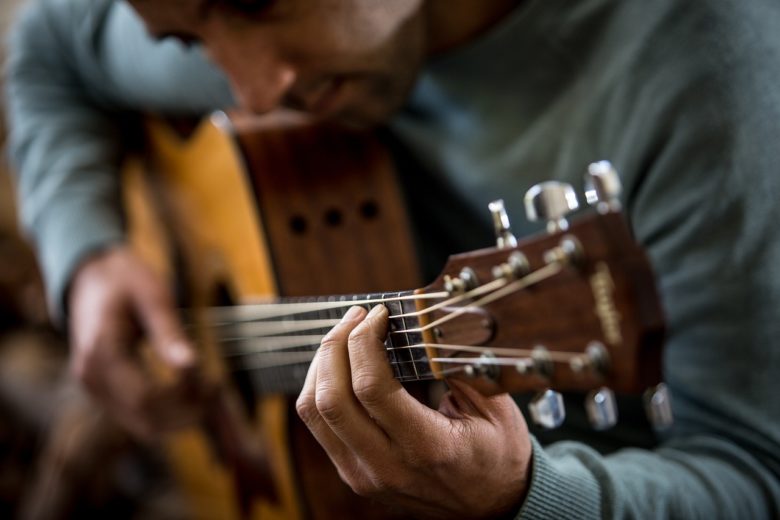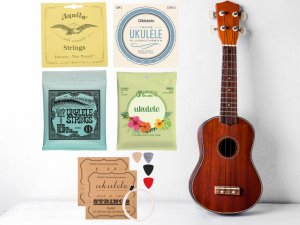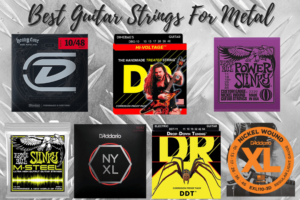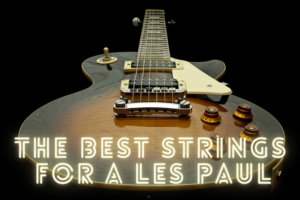Depending on the style of music you play, the type of acoustic guitar you have, and how much time you spend playing, you will need to adjust the type of strings you are using.
I’ve been buying strings for over two decades, and my clear favorite are the D’Addario EJ26s.
Take a look through the best guitar strings I’ve chosen, I’ve covered the best 5 on the market for acoustic guitar.
- D’Addario EJ26 Phosphor Bronze Acoustic Guitar Strings
- Elixir 16052 Phosphor Bronze Strings
- Ernie Ball Earthwood Phosphor Bronze Strings
- Martin Guitar MA540 Strings
- Elixir 80/20 Bronze Polyweb Strings
One of the first things you will notice when shopping for acoustic guitar strings is that they come in several different weights.
Medium gauge strings are the standard, but they tend to be stiffer and more difficult to work with for beginners. On the plus side, medium gauge strings produce a more robust sound with better volume.
By contrast, lightweight strings are easier to press and hold, and they are a bit more flexible if you are going for a modern sound, similar to an electric guitar. Many beginners prefer lightweight strings until they can build up the finger strength and calluses to handle medium weight strings.
Beyond the typical light and medium gauge strings, you may also come across extra light or heavy gauge strings while you’re shopping. These types of strings are used less often, but you can always experiment with them to see how they change the sound of your playing.
Carefully consider your string gauge and give yourself the best possible chance to succeed as you’ll be learning easy guitar chords and various guitar exercises when you first start.
One important note: Before you string up heavy gauge strings on your instrument, double check that the manufacturer has approved that gauge for use. Acoustic guitars use a complex system of braces inside to withstand the tension of fully-tuned strings. Using too heavy of a string gauge could cause the braces to crack or warp. This is also a good time to learn how to tune a guitar.
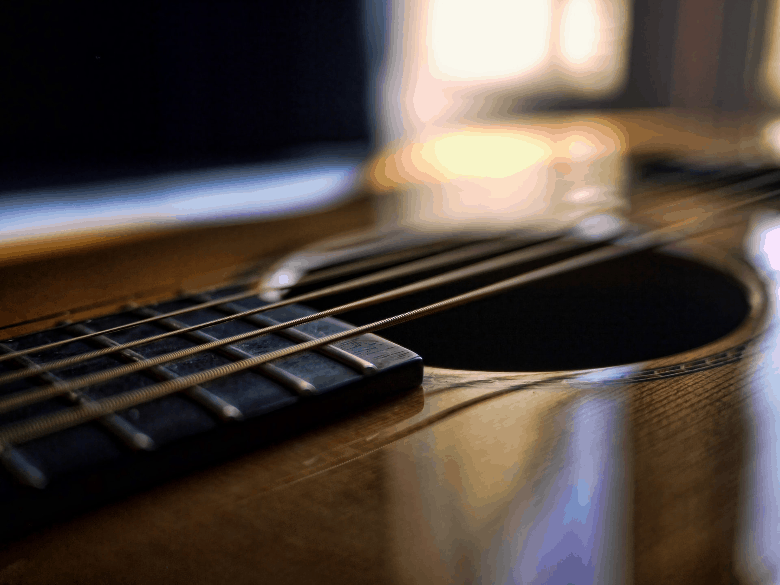
1.D’Addario EJ26 Phosphor Bronze Acoustic Guitar Strings

Pros: Solid Tone, Very Affordable And Available In Bulk Discounts, Comfortable, Long Lasting, Made In The USA
Cons: Not As Longer Lasting As Elixir Acoustic Guitar Strings
D’Addario is one of the most popular names in the world of guitar strings. They are well known for having such a wide range of available strings to suit any style of play. That said, these Phosphor Bronze Custom Light Weight Strings are a perennial favorite.
2.Elixir Acoustic Strings 16052 Phosphor Bronze
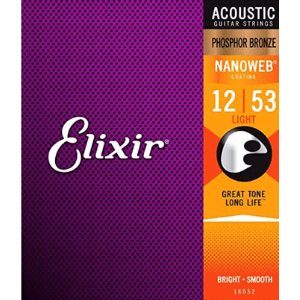
3.Ernie Ball Earthwood Phosphor Bronze Strings
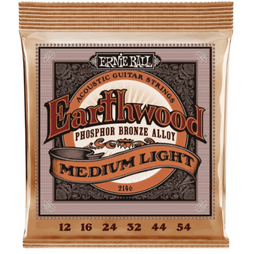
Pros: Very Rich Tone, Super Affordable, They Age Well
Cons: Not Treated For Corrosion Or Dirt
The Ernie Ball Earthwood line is a great option if you are looking for strings with a warmer, deeper tone. If you don’t like the sparkly highs of the other strings, a set of Earthwood might be right for you. On the plus side, the tone of these strings tends to stay pretty stable even as they age, so you won’t hear as much deadening as you would with other types of strings.
4.Martin Authentic Acoustic Strings MA540

Pros: Genuine Martin Strings At About The Same Price As Third-Party Strings, Extremely Versatile In Tone And Playing Style, Made For Live Performance
Cons: Not The Longest Lasting Strings On The Market
Martin has been around for more than 145 years, building beautiful guitars and making their own strings. While it isn’t necessary to only put Martin authentic acoustic strings on a Martin guitar, many people swear by these strings because of their value and performance. The best part is that unlike other specialty branded products, these Martin strings are right in line with their competitors for cost.
5.Elixir Acoustic Strings 80/20 Bronze Polyweb
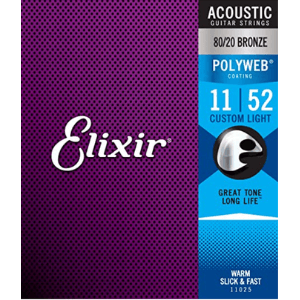
Pros: Polyweb Coated To Prevent Corrosion, Very smooth For Sliding And Playing, Extremely Durable
Cons: Sometimes You Can See The Milky Coating On The Strings
Elixir’s Polyweb strings are designed to be a little more sturdy than their Nanoweb options, which gives these strings a much deeper tone than the alternative. Many people like these strings because the sound they produce doesn’t change a lot as they age, and they are a bit cheaper than other Elixir acoustic strings while offering many of the same benefits.
The next thing you will notice is that acoustic guitar strings come in a variety of different core materials.
The most common option is 80/20 bronze, but you will also see that some strings are treated with other chemicals, like phosphor bronze.
Standard 80/20 bronze is a good starting place, but you may prefer the warmer, richer tone that comes with phosphor bronze strings.
It is also worth mentioning that some people prefer nylon strings. While there is no rule stating that you can’t use nylon strings on your traditional acoustic guitar, you should know that these strings may require some adjustments to the setup of your guitar to ensure that they have proper action for vibration without buzzing. It’s not something that’s usually done.
Classical guitar strings (nylon) are more common in the classical guitar world, so unless you are playing that style of music, they generally aren’t a good fit.
Strings age when the tiny gaps between the ridges of the material get filled with dust, dead skin cells, and oil from our hands.
To combat this, some companies coat their strings with a wax or polymer substance to help keep dust and dirt out and extend the life of the strings.
You will find that companies often offer these coatings in multiple tiers because the added material does deaden the sound of the strings somewhat. If you want a brighter tone from coated strings, you will need to find the lightest coating possible.

Wind Type
By far the most common type of windings on strings are round-wound. This just means that the outer string is round, and it is wound around the core to form the completed string.
However, there are some other options out there that you might want to learn about if you are interested in playing a specific type of music.
For instance, flat-wound strings use a flat outer wire wrapped around the core, which feels smooth to the touch and has fewer gaps. This is great for extending the life of the strings because it is harder for dirt to get in, but it drastically changes the tone of the strings as well.
Flat-wound strings are typically only used in jazz and blues style music where the muted tone is appropriate. You may also find half-round and other winding styles as well.
While it may seem odd for an item such as guitar strings to be counterfeited, there are many reports of such online.
The good news is that there are a few easy ways to spot fakes, so you can be sure you’re getting the best acoustic strings from a trusted manufacturer. First, you want to check the packaging of your strings.
Most manufacturers seal each individual string inside the pack in separate packaging. Check to make sure that the markings on each package match the box, and match the information from the manufacturer’s website.
Companies like Elixir and D’Addario also stamp quality control codes on each package that you can look for.
As you open each string, inspect it closely for signs of corrosion and poor wrapping.
Many people complain that the fake strings they receive are poorly constructed and the windings are loose right out of the package, making them difficult to play.
If the strings are properly sealed with quality control stamps, and they appear in good condition before you install them, you probably have nothing to worry about.
Getting the best acoustic guitar strings for beginners is easy when you know what to look for.
A Word of Warning
Not all guitar strings are the same, and you should always make sure to use proper acoustic guitar strings on your acoustic guitar.
Strings made for electric guitars are not designed to fit properly on an acoustic guitar and could cause damage to your headstock, fretboard, and tailpiece because they are too thin.
In addition, because electric guitar strings are so thin, they generally do not produce enough of a vibration to produce the sound you want from an acoustic guitar.
If you need help with finding a beginner guitar for children, check out our ‘Best Kids Guitar: Complete Guide To Finding The Right Guitar’
Best Acoustic Guitar Strings For Beginners
Conclusion
Now that you’ve seen some of the most popular acoustic guitar strings out there, you know how personal this choice can be.
However, my favorite strings are D’Addario EJ26s because they are both reasonably affordable and they have many of the added benefits that you would get from more expensive strings.
In addition, they tend to have a longer lifespan than their other competitors in this price range, and their tone is a nice middle-ground that isn’t too bright or too warm.
D’Addario EJ26s

For beginners, the versatility and affordability of these strings make them perfect for getting to know your way around an acoustic guitar and deciding what type of music you will be playing in the future. It’s time to learn some guitar riffs!

